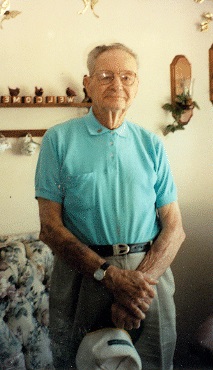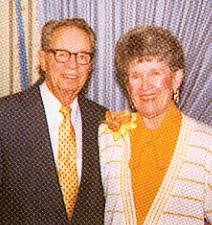
 Having known Bill Behrens since 1940 and having this chance to write
about him, I decided to tell some of his stories that he has told to me,
along with some history of the town of Bunker Hill, Illinois. Bill has a
terrific memory for his age (90 at this writing). Bill was born in 1911 to
George William Behrens and his second wife Frances Walker, George's first
wife, Lillian C. Keupper having died in childbirth. Bill already had a
brother (Louis) when he arrived and was to have two more after him. James
Samuel arrived in 1919 and Charles Adolph came along in 1922.
Having known Bill Behrens since 1940 and having this chance to write
about him, I decided to tell some of his stories that he has told to me,
along with some history of the town of Bunker Hill, Illinois. Bill has a
terrific memory for his age (90 at this writing). Bill was born in 1911 to
George William Behrens and his second wife Frances Walker, George's first
wife, Lillian C. Keupper having died in childbirth. Bill already had a
brother (Louis) when he arrived and was to have two more after him. James
Samuel arrived in 1919 and Charles Adolph came along in 1922.
Bill
was born in Gillespie and then the family moved to Litchfield where his dad
had a Drugstore. On August 15th, 1930 they moved to Bunker Hill. They moved
into an apartment over the Weishaupt Café. Mrs. Weishaupt may have just been
renting this building at this time, but she had rooms fixed upstairs for
traveling salesmen. When they stayed in town for a few days they stayed
there and then moved on. They had a pitcher and bowl to wash in and the
"slop-jar" was under the bed. The restroom was out in the back yard behind
the café.
After a couple of months the Behrens moved to a two story
house and they did this each year for awhile, one of the houses being the
Barbara Girth residence, (411 East Morgan) and then they built a glazed
brick home on North Franklin Street across the street from the
Congregational Church where Richard Elliott now lives (108 North Franklin).
Bill worked at Walgreen's in St. Louis a few years, but when Mr. William Fahrenkrog fell and broke both hips he asked Bill's dad to manage the store for him. Bill received his Pharmacist certificate in 1936. And then he met Miss Norma Clara Marie Boeker, who was working for a Lawyer (Droste) who had an office over by Mercer's Café and Miller's card shop. Norma came into the Drug Store each day and got a cherry Coke or a milkshake for her lunch. Even tho' Bill didn't have a car yet, he finally got up the nerve to ask her if when he got one could he have a date with her. Her answer was, "I will have to wait until next week and tell you."
 They married November 10, 1941,
and then the war came. Bill was in the Navy and while he and Norma were gone
his father and mother ran the Drug store. He was taking exercise in the Navy
when an officer came and told him that the Chaplain wanted to see him. Right
away, he got the feeling that this was about one of his brothers, but he did
not know which one, as they were all in service. When he went to the
Chaplain, he found out that it was his brother, Jim, who had died. Jim was a
pilot and the engine on his plane had quit as he was leaving the aircraft
carrier and he plunged into the sea. He died October 26, 1943. On the way
back to his quarters Bill was met by an officer, and Bill did not salute. He
was about to be written up when a younger officer explained to the officer
that Bill's brother had just died and that he had more things on his mind
than saluting.
They married November 10, 1941,
and then the war came. Bill was in the Navy and while he and Norma were gone
his father and mother ran the Drug store. He was taking exercise in the Navy
when an officer came and told him that the Chaplain wanted to see him. Right
away, he got the feeling that this was about one of his brothers, but he did
not know which one, as they were all in service. When he went to the
Chaplain, he found out that it was his brother, Jim, who had died. Jim was a
pilot and the engine on his plane had quit as he was leaving the aircraft
carrier and he plunged into the sea. He died October 26, 1943. On the way
back to his quarters Bill was met by an officer, and Bill did not salute. He
was about to be written up when a younger officer explained to the officer
that Bill's brother had just died and that he had more things on his mind
than saluting.
April 29, 1947 his only son, James William was born,
and three days later his father died. James has given him and Norma a
grand-daughter, Jaime Rhea, born May 22, 1977. She is now living in Minnesota.
Lots of people worked for Bill in the Drug store and although he can't
remember all of them, these few come to mind: A Julius Hook was one of the
earlier ones and there was a Jayne's boy who worked in the Lab at Shell Oil
Company. Bill had to let him go because every time he looked at him he was
eating another Chocolate Marshmallow Sundae. More workers were Liz Wieseman,
Becky Miller Wieseman, Shirley Stiegemeier, LeAnne Anderson, Harold Emery
and Charlotte Emery. Abbe Landon and Cletus Leverett also helped out a lot.
A woman came in quite often, and she would buy a pair of $10.00
sunglasses and then return them on Monday and get her money back. One day
she came in and bought a bottle of Cologne. Bill told her, you can buy the
Cologne today but you can't bring it back later and get your money back.
"Well," she said, "I just won't buy it then."
Around Halloween one
year, Bill and some of his buddies went to a country school Northeast of
town and brought the 8-hole "out-house" into town. It was a hard job, but
they finally got it into the Band Stand. While they were doing all of this,
Ed Schrier, who was the local town "cop," was sitting in the window of
Jacoby's furniture store watching them do it. The next day he came into the
drug store and told Bill, "You guys sure had a hard time getting that
out-house in there didn't you?" After he explained where he was and what he
saw, he then said, "I won't say anything to anybody, but by tomorrow it
better be gone." So Bill had to hunt his buddies up and around midnight they
moved the out-house back to where it came from. Of course I wanted to put
the names of these buddies in this article, but since some of them are still
around, we decided not to.
In the old days, the Drug store had two
slot machines in the back, that someone from Wilsonville had put in there
and each weekend Bill had to make sure there was enough change. He went to
the bank and got the change for the weekend and came back to the store and
counted it. Mr Haxel had given him $10.00 too much, so back to the bank he
went. Mr. Sanford and Mr. Haxel were talking and not wanting to "Butt in,"
he waited. Mr. Haxel finally said, "What do you want?" Bill started to tell
him about the mistake, when Mr. Haxel said, "After business is transacted at
the counter it is done with." So Bill thanked him for the $10.00 tip and
walked out. Mr. Haxel was speechless. Mr. Sanford put his hand on Mr.
Haxel's shoulder and said, "Now this ought to be a lesson to you to find out
what the customer wants before opening your mouth."
About the
funniest thing Bill saw from the Drug store was a couple coming out of the
local Tavern, "nude." They had their clothes wrapped around their necks,
they were holding hands and in their other hands, they each had a bottle of
"Gin." They went down the alley and headed for home.
Bill's mother,
Frances, lived to be almost 90 and she died November 12, 1982, and she,
husband George, and their son Jim are all buried in the Gillespie Cemetery.
Before the milk program in the schools she and some other women cut up
vegetables every morning and made vegetable soup for the school. Hilyard and
Duncan's meat market donated the meat.
People have asked Bill how he
could stand Mrs. Weishaupt's strong coffee. She made it by putting coffee in
a sock and boiling it, then she would throw two raw eggs in with it and the
coffee would put "hair on your chest." What they didn't know was that Mrs.
Weishaupt made a pot of weaker coffee for herself and when Bill came in she
gave him a cup of that. She had her pot behind the other one so no one knew
there were two pots.
Bill said he never missed a picnic affair up at
Piasa, Illinois. They held the picnic near the railroad tracks. The rich
people from Chicago (Doctors, Lawyers and Politicians) rented Pullman cars
and they were on the siding for the duration of the picnic. A good time was
had by all.
Bill's dad had signed a contract with Bill Fahrenkrog
that they would pay $50.00 each month plus interest at the end of six
months. This was for the fountain and the fans. Bill thought he had it paid.
But then Mr Fahrenkrog asked him if he had read the contract. Bill said,
"No," just what his dad had told him. When he read the contract, it stated
that he was to pay another $900.00 within 24 hours. Well, he knew it was
useless to ask Mr. Haxel to loan him money, but he decided he would ask him
anyhow. Of course the answer was "No." Someone was in the bank and heard the
conversation and he asked Bill if he had asked "Chick" Wise about borrowing
money. Bill did not know he loaned money, but went to see him. Mr. Wise
picked up his check book and asked how he wanted it written. Bill said,
"Just make it out to me." He cashed the check into nine $100.00 bills and
then laid them in front of Mr. Fahrenkrog. He was speechless, with his mouth
open. They never told where the money came from. Bill has kept all these
receipts over the years, and his son Jim now has them.
Bill and Norma
were interested in a lot on Union Street that he eventually built their
house on. It had been the former site of the Episcopalian Church many years
before, but it had been disbanded. The lady who owned the lot wanted her
husband and her to build a house there. But one day she came in and asked
Bill if he still wanted that lot. Sure he wanted it, but why had she now
decided she didn't want to build on it? She said her husband had wrecked his
car and when the insurance money came, he had spent it. So now to get even
she was just going to sell the lot and keep the money.
I love these
little stories that Bill can tell about the past. God has blessed Bill with
a wonderful memory, and I think these stories should be passed on.
Written and contributed by Lula Vaughn